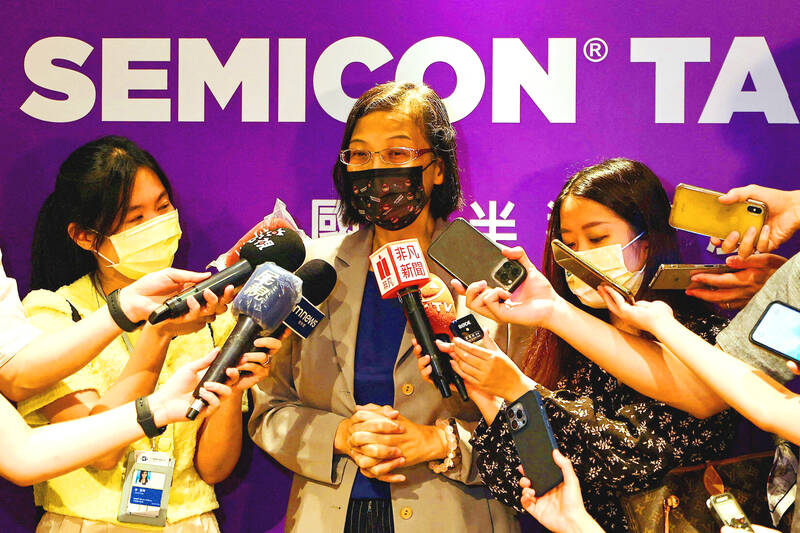GlobalWafers Co (環球晶圓), the world’s No. 3 silicon wafer supplier, yesterday said it secured up to US$400 million in direct funding from the US Department of Commerce under the CHIPS and Science Act for the construction of two new advanced fabs in the US.
Its subsidiaries GlobalWafers America and MEMC LLC are to build a 12-inch silicon wafer fab in Sherman, Texas, and another one in Missouri to produce silicon-on-insulator (SOI) wafers used to make leading-edge chips.
“With the support of the [US President Joe] Biden Administration, we are honored to be bringing to American shores the world’s most cutting-edge 12-inch semiconductor wafer technology, filling what the White House has called a ‘key vulnerability’ within the US semiconductor supply chain,” GlobalWafers America president Mark England said in a statement.

Photo: Ann Wang, Reuters
“GlobalWafers is fully committed to the US market, and we are excited to be playing a defining role in the nation’s semiconductor rebirth,” England said.
When completed, the Texas complex would be the first 12-inch silicon wafer fab built in the US in more than 20 years, he said.
The Texas facility is on track to ramp up volume production in the first quarter of next year, GlobalWafers said.
The new fabs would play a critical role in enhancing the resilience of US semiconductor supply chains, as they would supply US chip designers with domestic wafer capacity to make leading-edge chips for artificial-intelligence (AI) applications or to produce silicon photonics devices used in next-generation packaging technology, GlobalWafers said.
GlobalWafers would reduce the US’ complete dependence on overseas manufacturing facilities, the company said.
The planned 12-inch SOI facility in Missouri would be the first 12-inch fab based in the state when it is completed, the company said.
MEMC is operates an 8-inch SOI fab in Missouri.
The US government funding would be “greatly helpful” in elevating competitiveness of its US fabs, GlobalWafers chairwoman Doris Hsu (徐秀蘭) told a virtual media briefing yesterday, adding that US manufacturing costs tend to be much higher than in Taiwan.
The US$400 million grant would account for about 10 percent of the company’s overall investments of less than US$4.8 billion, Hsu said.
In addition to the direct grant announced yesterday, GlobalWafers plans to apply for the US Department of Treasury’s Advanced Manufacturing Investment Credit of up to 25 percent of qualified expenditures of its subsidiaries, Hsu said.
The US federal funding would comprise one-third of the company’s investments in the two US fabs, Hsu said.
GlobalWafers has secured long-term supply agreements from US customers, including GlobalFoundries Inc, to fill about 80 percent of its planned capacities at the Texas and Missouri facilities, Hsu said.

RECYCLE: Taiwan would aid manufacturers in refining rare earths from discarded appliances, which would fit the nation’s circular economy goals, minister Kung said Taiwan would work with the US and Japan on a proposed cooperation initiative in response to Beijing’s newly announced rare earth export curbs, Minister of Economic Affairs Kung Ming-hsin (龔明鑫) said yesterday. China last week announced new restrictions requiring companies to obtain export licenses if their products contain more than 0.1 percent of Chinese-origin rare earths by value. US Secretary of the Treasury Scott Bessent on Wednesday responded by saying that Beijing was “unreliable” in its rare earths exports, adding that the US would “neither be commanded, nor controlled” by China, several media outlets reported. Japanese Minister of Finance Katsunobu Kato yesterday also

Jensen Huang (黃仁勳), founder and CEO of US-based artificial intelligence chip designer Nvidia Corp and Taiwan Semiconductor Manufacturing Co (TSMC, 台積電) on Friday celebrated the first Nvidia Blackwell wafer produced on US soil. Huang visited TSMC’s advanced wafer fab in the US state of Arizona and joined the Taiwanese chipmaker’s executives to witness the efforts to “build the infrastructure that powers the world’s AI factories, right here in America,” Nvidia said in a statement. At the event, Huang joined Y.L. Wang (王英郎), vice president of operations at TSMC, in signing their names on the Blackwell wafer to

‘DRAMATIC AND POSITIVE’: AI growth would be better than it previously forecast and would stay robust even if the Chinese market became inaccessible for customers, it said Taiwan Semiconductor Manufacturing Co (TSMC, 台積電) yesterday raised its full-year revenue growth outlook after posting record profit for last quarter, despite growing market concern about an artificial intelligence (AI) bubble. The company said it expects revenue to expand about 35 percent year-on-year, driven mainly by faster-than-expected demand for leading-edge chips for AI applications. The world’s biggest contract chipmaker in July projected that revenue this year would expand about 30 percent in US dollar terms. The company also slightly hiked its capital expenditure for this year to US$40 billion to US$42 billion, compared with US$38 billion to US$42 billion it set previously. “AI demand actually

RARE EARTHS: The call between the US Treasury Secretary and his Chinese counterpart came as Washington sought to rally G7 partners in response to China’s export controls China and the US on Saturday agreed to conduct another round of trade negotiations in the coming week, as the world’s two biggest economies seek to avoid another damaging tit-for-tat tariff battle. Beijing last week announced sweeping controls on the critical rare earths industry, prompting US President Donald Trump to threaten 100 percent tariffs on imports from China in retaliation. Trump had also threatened to cancel his expected meeting with Chinese President Xi Jinping (習近平) in South Korea later this month on the sidelines of the APEC summit. In the latest indication of efforts to resolve their dispute, Chinese state media reported that